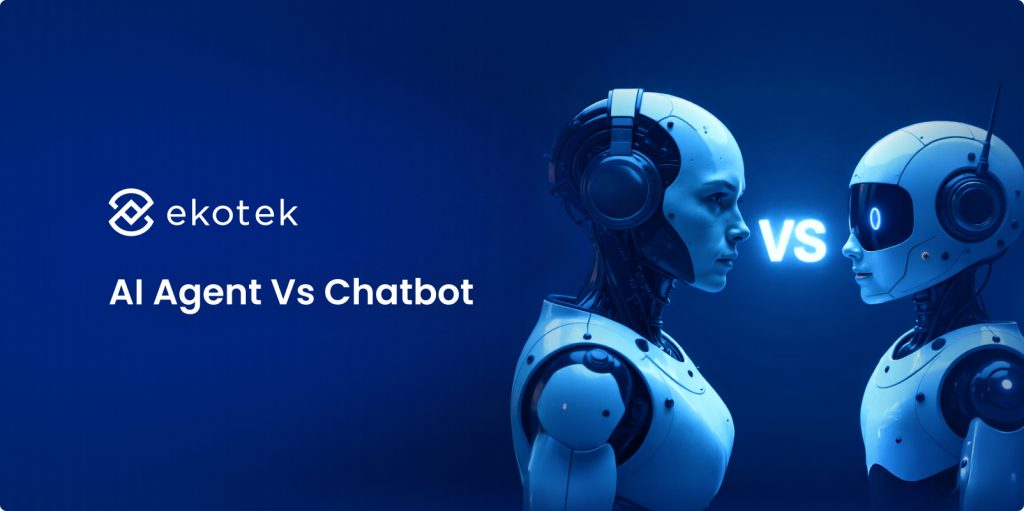Introduction: Understanding AI Agent vs Chatbot
In today’s competitive market, the question of AI agent vs chatbot has become critical for businesses. Companies cannot afford to deliver poor customer experiences or waste time on repetitive tasks, which is why AI-powered tools are no longer optional, they’re a necessity.
But here’s the catch: many organizations still confuse chatbots with AI agents, assuming they are the same. The truth? They are not. Chatbots offer basic automation, while AI agents provide intelligent, scalable solutions that transform how businesses operate.
In this article, we’ll break down AI agent vs chatbot, highlight the business impact of each, and show how companies like yours can leverage the right solution for long-term growth.
What is a chatbot?
Chatbot definition
A chatbot is a software program that mimics human conversation through text or voice. It is usually designed to answer predictable questions or guide users through simple processes.
Most chatbots rely on pre-programmed rules or scripted flows, allowing them to perform routine tasks consistently. However, this rule-based design restricts their flexibility, making it difficult to manage unexpected or complex queries. In contrast, modern AI agents, often built through custom AI development, can learn, adapt, and respond intelligently in dynamic business environments
Key characteristics of chatbots

- Rule- or script-based conversations: Chatbots typically follow decision trees: if a user asks “What are your opening hours?”, the bot provides a set response. This structure makes them easy to control but also inflexible when customers deviate from the script.
- Limited intelligence: Unlike AI agents, chatbots cannot reason or learn. Their “intelligence” comes from keyword detection or intent matching. If a question falls outside the programmed set, the chatbot either provides a generic reply or escalates to a human agent.
- No long-term memory: Chatbots treat each session as new. They can remember details within a single conversation, such as a booking reference, but once the session ends, that information is lost. This makes them less effective for building ongoing, personalized relationships.
- Fast and cost-effective deployment: Because they are simpler to design and require less infrastructure, chatbots can be set up quickly on websites, mobile apps, or social channels. For many small businesses, this makes them a cost-effective entry point into automation.
- Basic system integration: Chatbots can connect to a limited number of external systems (for example, retrieving an order status from a logistics API). However, they cannot orchestrate complex workflows across multiple systems the way AI agents can.
Business use cases of chatbots
- Customer FAQ automation: Chatbots excel at answering repetitive questions such as store hours, refund policies, or service pricing. By deflecting these inquiries, they reduce call center load and improve response times.
💡 Unlock the future of customer service with ChatGPT-powered solutions
- Order tracking and shipping updates: Many e-commerce companies use chatbots to handle “Where is my order?” questions. The bot pulls real-time data from order management systems and delivers instant updates, saving human agents from answering thousands of routine tickets.
- Appointment scheduling and reminders: Chatbots can help customers book appointments, confirm reservations, or reschedule existing ones. They can also send automated reminders, which reduces no-shows and improves efficiency for service-based businesses.
- Lead capture and qualification: On websites, chatbots act as the first point of contact. They collect visitor information, ask qualifying questions, and pass only high-potential leads to the sales team. This improves lead quality while keeping sales reps focused on valuable prospects.
- Internal employee support: Some organizations deploy chatbots internally to assist staff with common IT or HR requests, such as resetting passwords, checking leave policies, or accessing forms. This reduces helpdesk tickets and allows internal teams to focus on higher-value work.
What is an AI agent?
AI agent definition
An AI agent is an advanced software system powered by artificial intelligence that can understand, learn, and act autonomously. Unlike chatbots, which rely on rigid scripts, AI agents use technologies like natural language processing (NLP), machine learning, and large language models (LLMs) to interpret intent, maintain context, and take action.
They are not just conversational tools, they are digital co-workers capable of reasoning and executing complex workflows across different business functions.
Key characteristics of AI agents

- Contextual memory across interactions: AI agents can remember past conversations, preferences, and user data. For example, if a customer inquires about a product one day and asks about delivery options the next, the AI agent recalls the context and continues naturally.
- Multi-step task handling: Unlike chatbots that only answer one question at a time, AI agents can execute multi-step processes. For instance, they can process a customer complaint by verifying account details, checking warranty coverage, filing a ticket, and scheduling a service call, all without human intervention.
- Integration with business systems: AI agents are designed to connect with enterprise applications such as CRMs, ERPs, ticketing platforms, and HR systems. This enables them to not only answer questions but also take real action inside business workflows.
- Adaptive and personalized responses: AI agents don’t just give static replies. They adapt to user behavior and tailor their responses based on preferences, history, or tone. This leads to interactions that feel more “human” and create stronger relationships with customers or employees.
- Continuous improvement: Because they use machine learning, AI agents can improve over time. They learn from user interactions, update their knowledge, and become more effective without requiring constant manual updates.
💡 Build your own AI agent with our step-by-step guide
Business use cases of AI agents
- Intelligent customer support: AI agents can resolve complex issues, escalate only when necessary, and provide consistent, 24/7 service. This reduces dependency on human agents and improves customer satisfaction.
- Sales automation and lead nurturing: Instead of just capturing contact information, AI agents can qualify leads, send personalized follow-ups, and even recommend products or services, helping sales teams close deals faster.
- End-to-end workflow automation: In finance, HR, or operations, AI agents can process invoices, approve expenses, onboard employees, or monitor compliance. They act as a bridge across multiple systems, saving time and reducing errors.
- Employee support and knowledge management: AI agents act as internal assistants that help employees reset passwords, find company policies, or generate reports. Unlike chatbots, they can pull data from multiple sources and provide context-specific answers.
- Decision support for managers: AI agents can analyze business data, highlight trends, and recommend next steps. For example, in retail, an AI agent could review sales performance and suggest adjusting stock levels or promotions.
💡 To implement these capabilities, many enterprises rely on AI development services for custom-built solutions
AI agent vs chatbot: Key differences explained
| Aspect | Chatbot | AI agent |
|---|---|---|
| Technology | Rule-based, script-driven | Powered by AI/LLMs with contextual memory |
| Capabilities | Handles FAQs and simple tasks | Executes multi-step, complex workflows |
| Personalization | Limited, one-size-fits-all responses | Adaptive, context-aware interactions |
| Integration | Basic website or app chat | Connects with multiple enterprise systems |
| Scalability | Needs manual updates to grow | Learns and scales with your business |
| Cost and ROI | Low upfront cost, limited long-term value | Higher initial cost, better ROI over time |
| Customer experience | Often robotic, may frustrate users | Feels natural, improves satisfaction |
| Best fit | Small biz, FAQs, simple service | Enterprises, automation, personalization |
This comparison makes one thing clear: chatbots are best for simple, low-cost automation, while AI agents deliver deeper intelligence, adaptability, and long-term value. The right choice depends on your business goals, whether you need quick support for FAQs or a scalable solution that transforms customer experience and operations.
💡 See how enterprises leverage LLM chatbots to deliver smarter engagement
Why AI agent vs chatbot differences matter for businesses
Business benefits of chatbots
 For many companies, especially startups or small businesses, chatbots are an attractive entry point into automation. Their benefits include:
For many companies, especially startups or small businesses, chatbots are an attractive entry point into automation. Their benefits include:
- Cost-effective customer support: Chatbots reduce the need for a large support team by automatically handling common questions. This lowers labor costs while ensuring customers still receive timely responses.
- Faster response times: Customers no longer wait on hold for simple requests. Chatbots provide instant answers, which improves basic service quality and reduces customer frustration.
- 24/7 availability: Even outside business hours, chatbots can manage inquiries. This helps companies expand their service coverage without additional staffing costs.
- Lead capture and conversion: On websites and apps, chatbots greet visitors, collect contact details, and pass qualified leads to sales teams, ensuring no opportunity is missed.
- Easy deployment: Chatbots are relatively quick to set up and maintain, making them a practical solution for businesses with limited resources or straightforward customer service needs.
💡 Find out how to make AI a seamless part of your business strategy
Business benefits of AI agents
 For organizations with more complex needs or growth ambitions, AI agents provide significantly greater value:
For organizations with more complex needs or growth ambitions, AI agents provide significantly greater value:
- End-to-end process automation: AI agents don’t just answer questions, they execute multi-step tasks. From processing refunds to scheduling services, they reduce manual work across multiple departments.
- Personalized customer experiences: By remembering past interactions and learning user preferences, AI agents deliver tailored support. This boosts satisfaction, loyalty, and ultimately lifetime customer value.
- Scalable growth: As businesses expand, AI agents adapt without needing constant manual updates. They can handle rising volumes of inquiries or transactions without proportional increases in headcount.
- Data-driven decision support: AI agents can analyze patterns from customer interactions and internal data, then recommend actions. This helps managers make better, faster business decisions.
- Long-term ROI: While the upfront investment is higher, AI agents reduce operational costs, shorten resolution times, and increase productivity. The long-term financial return far outweighs the initial cost.
AI agent vs chatbot: What are the potential pitfalls?
Pitfalls of chatbots
- Limited scope: Chatbots often frustrate customers when questions fall outside their programmed flows. This can damage trust if customers feel they are “talking to a wall.”
- Maintenance burden: Every time products, services, or policies change, scripts must be manually updated. Over time, this can become costly and time-consuming.
- Lack of personalization: Because chatbots cannot remember past conversations, they deliver repetitive, one-size-fits-all experiences that may not meet rising customer expectations.
- Escalation overload: Chatbots typically pass complex issues to human staff, which means savings from automation are limited. If volumes are high, this creates bottlenecks.
Pitfalls of AI agents
- Higher initial investment: AI agents require more advanced infrastructure and integration. For smaller businesses, the upfront cost can be a barrier.
- Integration complexity: Connecting AI agents to multiple enterprise systems (CRM, ERP, HR tools) is powerful but also technically complex, requiring time and resources.
- Data privacy and compliance: Because AI agents use customer data for personalization, companies must ensure strict compliance with data protection regulations. Mismanagement here carries reputational and legal risks.
- Change management: Deploying AI agents often requires teams to adapt workflows. Without proper training and buy-in, employees may resist or underutilize the technology.
The future of business AI: beyond chatbot vs AI agent
From chatbots to AI-augmented chatbots
Basic chatbots are increasingly being enhanced with AI features such as natural language processing and limited contextual memory. This makes them more effective than older, rule-based bots, but they will still serve mainly as entry-level solutions for handling straightforward interactions.
AI agents as core business infrastructure
AI agents are moving beyond customer support into core business functions: finance, HR, operations, sales, and strategy. Instead of being “just another tool,” they are becoming an integral layer of digital infrastructure, automating workflows across departments and enabling data-driven decision-making.
Competitive advantage through early adoption
Enterprises that begin experimenting with AI agents today will be better positioned to scale them tomorrow. Early adopters are already using AI agents not just to cut costs but to create new value, from hyper-personalized customer journeys to predictive insights that shape market strategy.
Human-AI collaboration
The future is not “AI replacing humans” but AI agents collaborating with employees. Businesses will use them to offload repetitive, time-consuming work, while people focus on creativity, strategy, and relationship-building. Companies that embrace this synergy will unlock higher productivity and stronger innovation.
Ekotek’s proven AI chatbot and AI agent solutions
AI-powered automation for a global footwear manufacturer
Ekotek helped a leading footwear manufacturer transform their Bill of Materials (BOM) creation process. By combining Computer Vision and Natural Language Processing (NLP), our AI agent automatically analyzed shoe design drawings, extracted material specifications, and generated structured BOM files. This innovation drastically reduced manual effort, minimized errors, and streamlined cross-department collaboration.
👉 Discover how AI agent can revolutionize manufacturing efficiency
AI chabot for smarter customer support
NFTify, a no-code NFT marketplace platform with over 20,000 users, needed an intelligent solution to provide real-time, multilingual customer support. Ekotek built a ChatGPT-powered AI chatbot, trained on NFTify’s internal documentation and FAQs. The chatbot not only understood user intent and context but also delivered 24/7 multilingual support with seamless integration into the website, improving response time and customer satisfaction.
👉 Learn how AI chatbots can scale global customer service
Multilingual news summarization
Ekotek developed an AI-driven news summarization tool designed for global entrepreneurs. Powered by ChatGPT 3.5, the solution automatically summarizes, translates, and organizes industry news across 100+ languages. Professionals can now consume condensed insights, save articles, and stay ahead of industry trends without language barriers or information overload.
👉 Find out how AI can turn information overload into actionable insights
Conclusion: Key Takeaways on AI Agent vs Chatbot
Chatbots and AI agents may seem similar at first glance, but their capabilities and business impact are vastly different. Choosing the right solution depends on your business goals: whether it’s cost-effective support for small operations or scalable, intelligent automation for enterprise growth.
As a trusted AI development partner, Ekotek combines deep expertise, industry experience, and agile development to create future-ready AI solutions. From strategy consulting, custom chatbot development, generative AI, and agentic AI to AI integration and large-scale deployment, we tailor our services to meet your unique business needs. Whether you’re just starting with automation or scaling advanced AI initiatives, our team ensures fast, high-quality delivery that drives efficiency, improves decision-making, and accelerates growth.
FAQs on AI Agent vs Chatbot for Businesses
1. What is the main difference between an AI agent and a chatbot for business use?
The main difference lies in intelligence and adaptability. Chatbots follow pre-defined rules to answer repetitive questions, while AI agents use advanced reasoning and learning to handle complex workflows, automate decisions, and adapt to dynamic business environments.
2. Which is better for customer service: AI agents or chatbots?
For basic FAQs and scripted interactions, chatbots are cost-effective and reliable. However, businesses aiming for personalized, scalable, and 24/7 support will benefit more from AI agents, as they can understand context, learn from interactions, and deliver higher-quality experiences.
3. Can AI agents and chatbots work together in one organization?
Yes. Many enterprises deploy chatbots for simple queries and AI agents for more advanced tasks. This hybrid approach balances efficiency and intelligence, helping businesses reduce costs while improving customer satisfaction.
4. How do I decide whether my company needs an AI agent vs chatbot?
Start by analyzing your goals. If you need quick automation for repetitive tasks, a chatbot is sufficient. If your business requires intelligent decision-making, real-time adaptation, and workflow automation, investing in AI agent development is the right choice.


